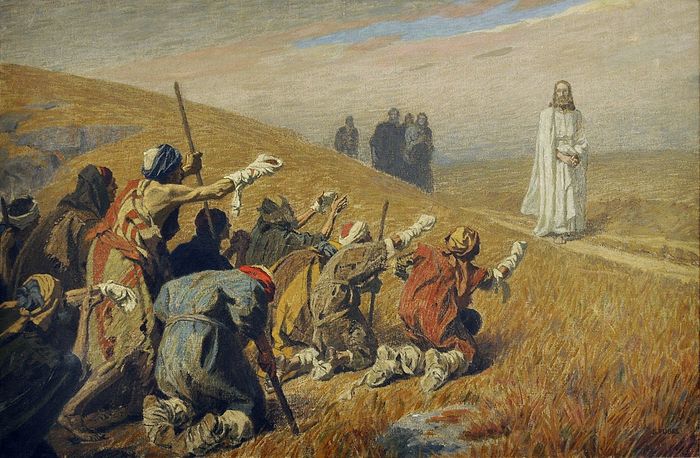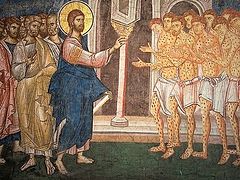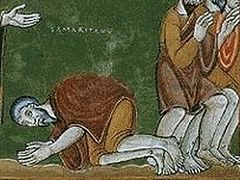And as he entered into a certain village, there met him ten men that were lepers, which stood afar off: And they lifted up their voices, and said, Jesus, Master, have mercy on us. And when he saw them, he said unto them, Go shew yourselves unto the priests. And it came to pass, that, as they went, they were cleansed. And one of them, when he saw that he was healed, turned back, and with a loud voice glorified God, and fell down on his face at his feet, giving him thanks: and he was a Samaritan. And Jesus answering said, Were there not ten cleansed? but where are the nine? There are not found that returned to give glory to God, save this stranger. And he said unto him, Arise, go thy way: thy faith hath made thee whole.
 Gebhard Fugel. Christ and the leper. Diocesan Museum Freising. Photo: WikiMedia
Gebhard Fugel. Christ and the leper. Diocesan Museum Freising. Photo: WikiMedia
Today’s Gospel tells us about the mystery of gratitude. Ten lepers were healed. And one of them returned to give glory to God and render Him thanksgiving. Why didn’t they all return to Christ and thank God for this miracle? Why not nine out of ten? Where were the rest?
Don’t thousands of people receive healing every day?—but only a few dozen stand praying in church. Doesn’t God send the light of the sun down upon all?—but only a few hundred come to give thanks. Could it be that there are only a few people in the world who have love and earthly success, wealth, wisdom, happiness, friends, and children? Where are they? Only one out of ten thanks God for all this.
This is our common spiritual leprosy—ingratitude to God and people. And obviously, this illness is the cause of all outward catastrophes, including death. But perhaps this common catastrophe could unite everyone? By the way, we know nothing about the ten lepers, but the Gospel tells us that one of them was a Samaritan. We recall that according to the belief of the Jews, the Samaritans were people who simply could not be saved—they were outcasts whom the Jews strove to avoid at all cost. And since the Gospel accentuates that one of the ten was a Samaritan, the other nine were in all probability Jews. The dividing line between the Jews and this outcast Samaritan had disappeared, because they were all stricken with that common problem. Here there is no meaning left in different nationalities, in what position one occupies in society, if all are sentenced to death. This terrible illness united all the lepers together.
God’s Providence so leads mankind, so leads our people that in visiting them with disasters, all are united into one. Thus, so that all would come together, and so that out of their common disaster they would all raise their voices to the Lord, saying, “Jesus, our Teacher, have mercy on us!” Nevertheless, this united cry for mercy can be born from one faith in the One Who has the power to heal any mortal wound.
From the medical point of view, the situation of the ten lepers was absolutely hopeless. Only miraculous intervention could heal them and return them to the company of healthy people. There was no one in the world who could give them even a modicum of hope. Anyone who has ever experienced the fear of death, the horror of absolute isolation, despair, and abandonment by everyone knows that a cry of mercy can come from blind hope—someone somewhere for some unknown reason and in some strange manner will say one miraculous word, and suddenly a window opens up in the gloomy and endless human woe. Ten lepers turned to Christ, and He heard their cry.
The Lord told them to go and show themselves to the priest. And they believed Christ’s words. But their healing took place only after they were on their way to the temple. As they walked, they were cleansed, says the Gospel. O, if only our people would admit today that all existing human means for their salvation have already been exhausted, and now stand literally like beggars before Christ God, asking Him only for mercy! If only all would overcome the demonic gloom of unbelief and despair, if all would hasten to the temple of God to show themselves to the priests—then a miracle would happen even as they were on their way: Everything would change in our land, as St. Silhouan the Athonite used to say repeatedly.
But the miracle would not help if nine out of ten were to receive healing in the same way as the Gospel lepers—as if it were their due, with thoughts that after all God, if He exists, must sooner or later deliver them. Did they suffer justly? They didn’t deserve that suffering. If supreme justice exists in the world, then that healing has to happen. And so it happened. They were happy that they received what they asked for. But it didn’t enter their heads to bring praise to the One Who gave them this blessing. Only one, the outcast Samaritan, stood in amazement before the miraculous, healing, and saving God, and rushed to render Him praise. Nine out of ten gained healing, but lost the Healer.
Apparently he served them in their acquisition of earthly aims; but who needs Him now? It’s good for us if today after having reached our final limits we hope in a divine miracle. But woe to us if we seek only healing of our external sorrows, only deliverance from the calamities in which we’ve found ourselves, but do not seek the only miracle—Christ Himself, without Whom life is monotonously unmiraculous, monotonously dim, and dying on the vine before us. It doesn’t matter if we’re happy or unhappy.
The Lord gives us many miracles Himself, and also through His numberless saints. Especially in recent times there have been so many miracles given to our Church, especially through the Royal martyrs, through all the New Martyrs and Confessors of Russia. And in every miracle is the mercy of the Living God, Who is being born for our sake, takes on our flesh, takes upon Himself the weight of our guilt and sin, all our disfigured lives, and carries them to His Cross in order to give us not temporary alleviation of our sufferings but a new life in His Resurrection.
God seeks our thanksgiving not because He needs it, but because we need it; because through this thanksgiving we can truly commune with Him and receive all that He has. Perhaps we need today more than ever to learn in response to Christ’s suffering love to glorify God for all things—first of all for the great sorrows and sicknesses by which He visits us now; because thanks to them we are in no condition to get stuck in anything earthly. And thanks to them we will learn to understand better that there simply is no adequate response to God’s mercy other than bringing ourselves to Him in gratitude.




